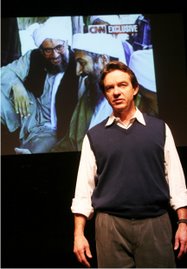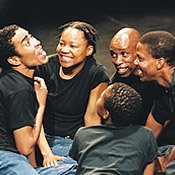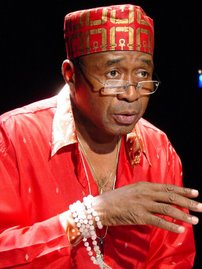This is a bit belated - it's a re-post from a piece I wrote for openDemocracy about the World Social Forum in Kenya, which I attended in my capacity as producer of Women Center Stage, Culture Project's annual multi-disciplinary arts festival focusing on women artists who are calling our attention to issues of social justice globally.
Growing up a young white woman in New York City, my world was comfortable, it was integrated, and my feminism was without a name and assumed. I say with not a small amount of shame that it was only very recently that I understood acutely enough that only for white and privileged women is feminism about reproductive rights, glass ceilings and the stiletto-or-not debate. And I am looking for deeper connections, for wider, meaningful work.
In 2007, there is a palpable paradox: women take leadership positions from Chile to Germany, as women from Ukraine to the Dominican Republic are trafficked into prostitution and the right of women in the United States to sovereignty over their bodies is carefully dismantled. Countries like Mexico and South Africa allow employers to keep women from work due to pregnancy; in Morocco, Kuwait, and Saudi Arabia, women’s legal rights belong to male family members. Each day, in every part of the world, women are beaten in their own homes.
The World Social Forum has made this co-existent diversity and commonality of experience palpable.
Arriving in Kenya, my first trip to any African country, I found myself enraged (at myself? at my schooling?) by how little I know about the world, and even about my own country. I have so little real information, know so little about real people and their experiences. And so I began to understand that my job in Nairobi was to listen.
So I’ve tried to pull out themes that emerged in the sessions I’ve been to:
The first is a call from women in all parts of the world to shake off the limitations implied by our attachment to the language of patriarchy. That, in re-visioning the world, we continue to use and accept assumptions asserted by an old standard. It is within our rights – perhaps our responsibility – to re-work the vocabulary and the assumptions as we work to make change. As a young woman said at a Young Feminists meeting, “we are not just a women’s movement, we are women in movement.”
The second point follows closely: as women in movement, generational disconnects seem to come up again and again. In a youth circle, an older woman thanked younger women for carrying the torch in a long speech, but left the room as soon as younger women began speaking; in a session on women elected leaders, young women lamented a lack of mentorship and begged for more guidance and support; older women observed that younger women don’t seem to have a sense of their history or a tie to any coherent movement. And these things were expressed across barriers of country, ethnicity, socioeconomic status, what-have-you.
A third, related, point is that, as women, we can tend to fight to be in the space we have, rather than fighting to expand the space. Women talked a great deal about competition between one another, and a barrier between generations and classes of women, and called strongly for more solidarity. They brought up, in every session, the importance of “knowing each other better,” learning from each other, and supporting each other – and expanding the space so as to be able to stand together.
Finally, women globally are calling the world’s attention to a wide range of social justice issues in their regions and homes. Women fight side by side with men, and with a unique worldview, in the labor movement, in the environmental movement, in the immigration movement and in countless other struggles of countless other people and communities. The global women’s movement is a call to action for equality and safety for all people, everywhere.
By the closing of the World Social Forum, I felt deeply all the beauty and contradictions of the event. For 7 days, I walked through the most diverse throngs of people I’ve ever seen – people from African countries in tribal dress, people from African countries who would blend in anywhere in the U.S., women in saris, endless types of headdress. I saw a woman in a full burkha, but openly holding hands with the man she was with – no gloves even!
What if the world really looked like this! And of course, it’s a small oasis and not without its problems and complications. Many Kenyans protested the Forum because even the reduced price for them was a day’s wages and not at all affordable. And once we were all safely home, two of these citizens - young boys - were executed for their efforts. Yes, they were executed.
One afternoon, as I was admiring the number of men wearing t-shirts that read “women are not property,” I was approached by a young man from Sierra Leone who wanted to chat. He told me that he works as an anti-mining activist, and we talked about Sierra Leone and the Appalachian coal-mining region in the U.S. And then he said, “I would like to bring you to my country,” to which I replied, “I’d be very interested to see it.” He said, “Yes, you will marry me and come to live in my country.” When I explained that wouldn’t be possible he thought for a moment and then asked if I have a sister. I told him that she is sixteen. “Ah,” he said, dead serious, “the perfect age for marrying. Very obedient. You will give her my picture when you go home.”
But what an extraordinary event this was! I quickly came to relish being in the minority for a period (I’m sure tempered by the fact that it was temporary), reminding myself to listen and not to hold tight to my own views and experience. I loved seeing so many different colored people engaged in real conversations, and to see that there is work going on constantly, at the most local, grassroots level, as well as in global partnerships. As a woman said in the last day's final Women’s Forum, the World Social Forum gives us a moment to take the work we’ve done and put it on the world table. And in the end – to sum up the parts of the whole as best as I can – as we meet and grow in our work, we make another world possible.




No comments:
Post a Comment